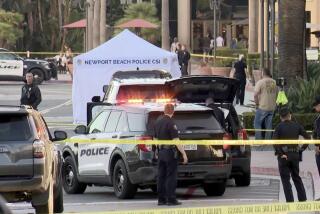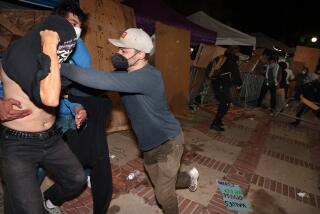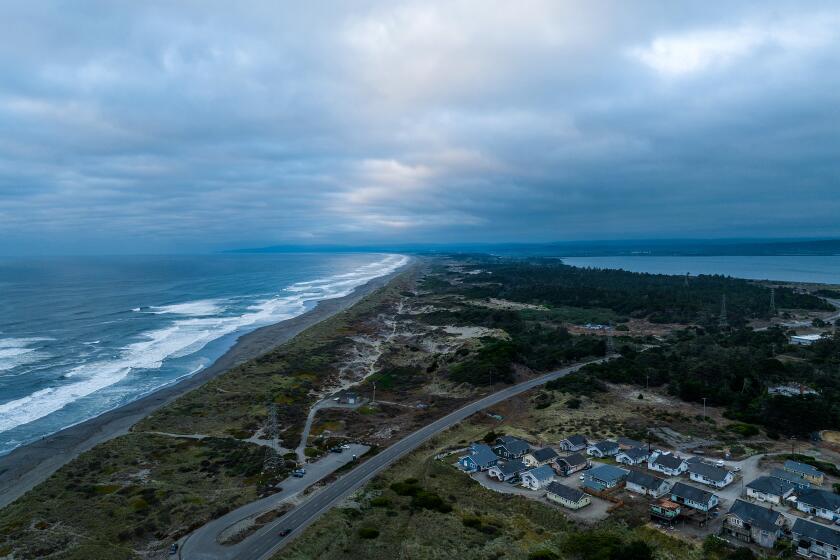‘It’s Too Bad That His Dream Was Broken’ : Carjacking: Parents of the two teen-agers who were shot talk of their sons’ love of America and their dreams of filmmaking. Doctors declare them brain-dead.
Two teen-age college students from Japan who came to the United States to pursue their dreams of becoming filmmakers, only to be gunned down in a carjacking, were pronounced brain-dead Sunday--the day their parents arrived from Japan.
The families expressed no bitterness, but said they were grateful for the good experiences their sons had here. “He loved America,” said Akihiro Ito, father of shooting victim Takuma Ito.
Ito and Go Matsuura, both 19-year-old students at Marymount College, were being kept alive by respirators at Harbor-UCLA Medical Center after being shot in the backs of their heads in the Friday night carjacking in the parking lot of a San Pedro supermarket.
With no suspects, Los Angeles police have appealed to the public for help in finding the victims’ white 1994 Honda Civic, and the gunman or gunmen.
On Sunday, Harbor-UCLA Medical Center was crowded with Japanese camera crews and reporters, who were covering the shooting as a top story--one that followed on the heels of several other high-profile shootings of Japanese students in the United States. The shootings have raised the fears of many Japanese parents about sending their children abroad.
Marymount College students and friends, both Japanese and American, kept vigil at the hospital during the weekend. The Japanese students gathered quietly and told reporters they preferred to keep their grief private. Many American students wanted to express anger at the violence, and spoke with fondness of the two young men they described as fun-loving and dedicated to becoming filmmakers.
After improving their English at Marymount, Ito hoped to go to UCLA and Matsuura to USC to pursue their filmmaking studies, friends said.
“His hobby was becoming American,” said friend and fellow student Erica Stenta.
Joshua Escandon, Ito’s roommate, said the Japanese student was a fan of Steven Spielberg’s work, especially his “Indiana Jones” movies. “He was a great guy. He had a wonderful personality. He was very, very funny,” Escandon said.
Matsuura’s roommate, Clayton Blocker, said he and Matsuura hit it off right away when they were assigned to share an apartment last fall. “I didn’t think it was his time to go. I don’t think he deserved to die,” Blocker said.
Ito’s and Matsuura’s parents flew here to be at their sons’ bedsides and to make the decision about terminating life support.
Dr. Curtis Doberstein, acting chief resident in neurosurgery at Harbor-UCLA, said both were shot at close range. The bullets did not exit their heads.
“After thorough discussion with the families, making sure they understand the criteria for brain-death, they will be taken off life support,” Doberstein said.
In Japan, a person is considered alive until the heart stops beating. It is important to take such cultural differences into account, Doberstein said.
The fathers of the victims, speaking at a news conference at the hospital, struggled to convey happy memories of their sons’ dreams.
Akihiro Ito, an executive with a subsidiary of Japan Air Lines, said in Japanese that his son had told him since junior high school that “I like America. I want to go to America. I want to make movies.”
Ito said that before his son came here, he was “a little worried,” but what happened was “my child’s fate.”
“For eight months, he had an enjoyable, enjoyable experience in America. Now, we must make an effort that this kind of sad event won’t happen to Japanese young people again,” he said.
Go Matsuura was born in the United States and was in first grade when he went to Japan with his family, his father said.
“He thought America was a place where you could realize your dreams. So he came to America,” Shuji Matsuura said. “He was always saying he liked it here. We were glad.
“Then this happened. It’s too bad that his dream was broken in the America my son loved.”
His eyes downcast, Matsuura asked in Japanese: “Isn’t there something we can all do so that this doesn’t happen again?”
Spring break had emptied much of the campus of Marymount College in Rancho Palos Verdes, where flags remained at half-staff on the picturesquegrounds set high above the Pacific Ocean.
“It’s a spot where no one even thinks of crime at all because it’s not a problem,” said Kevin O’Connor, assistant director of admissions. “This is a shock to everyone.”
At the Ralphs supermarket on Western Avenue in San Pedro, where the shooting occurred about 11 p.m. Friday, several bouquets of flowers had been laid in the parking lot.
Los Angeles police were looking for the car, license 3GPM186, and any information about the crime. Detectives with the Robbery-Homicide unit of LAPD’s Major Crimes Section can be reached by calling (213) 485-2129 or (213) 485-2504.
Two of the students’ friends, who live near the supermarket, say that when they saw the car a week ago, it bore a bumper sticker reading “I Love New York,” another touting World Cup soccer, and a third, in green, read “Boulder, Colorado.”
American friends of the two young men said that this episode made them realize just how dangerous Los Angeles has become--and how the danger is taken for granted.
“I want you to put something in your article,” Stenta insisted. “We have to stop accepting this as a normal, everyday part of life. Everybody has to stop it--don’t allow it. It can’t go on like this.
“Why doesn’t Japan have problems like this? They don’t have guns on the street. We’ve got to have stronger laws or we’re going to kill each other off.”
Times staff writer Jeffrey Rabin contributed to this story.
More to Read
Sign up for Essential California
The most important California stories and recommendations in your inbox every morning.
You may occasionally receive promotional content from the Los Angeles Times.










